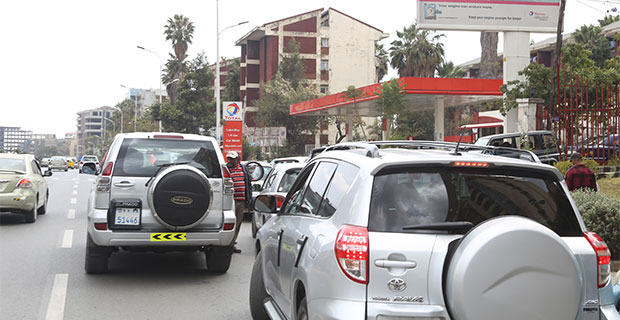
Viewpoints | Apr 20,2024
An exorbitant rise in international prices for crude palm oil threatens to undermine the already low production by domestic edible oil plants.
The federal government earmarked 400 million dollars to import crude palm oil this year, mainly from Malaysia, for distribution to five large-scale edible oil plants. The quota was set in July 2021, when prices for a tonne of the oil were 1,100 dollars, nearly double the going price from the previous year. Prices have jumped by a whopping 63pc since, not including transportation and insurance costs. The country needs to spend over 1,900 dollars to buy a tonne of crude palm oil.
The Ministry of Trade & Industry imported 89,000tn of semi-processed palm and soybean oil over the last year to ease domestic oil plants' shortage of inputs. The import of edible and crude oil accounted for over 85pc of the 27 billion Br in import bills from Malaysia last year.
Phibela, Worku Aytenew (W.A.), Shemu, Harmessa and Al-Impex are the five industrial-scale oil plants that receive the federal government's allocation. These plants produce to meet nearly a third of the total monthly demand of 75 million litres of edible oil. The 232 small- and medium-size palm oil processing plants that source inputs domestically account for 10pc of supply. A survey conducted by the Ethiopian Edible Oil Manufacturer Industries' Association revealed that the industry is gripped by challenges in shortages of agricultural inputs and associated price surges.
The most aggravating issue remains the unavailability of foreign currency needed to buy crude palm oil and replace machinery.
The [five] companies are operating with what has been approved initially, according to Nigus Chernet, head of the team in charge of supervising the food and beverage industries at the Ministry of Trade & Regional Integration.
Phibela, a subsidiary of the Belayneh Kindie Group, produces edible oil at its plant in the Bure Agro-Industrial Park, in the Amhara Regional State. Inaugurated last year, the plant has a production capacity of 1.5 million litres a day.
Shemu, with a plant in Dire Dawa, can process close to two tonnes of crude oil a day following an expansion project it completed last year. However, it is struggling to meet even a third of its capacity. In operation since 2017, the plant has been under the Shemu Group, a conglomerate comprising 15 companies, including Shemu Detergent and Asveza Ethiopia Retailing. It has been granted access to the forex quota for the past two years. In September 2020, the company secured 8.5 million dollars through the former Ministry of Trade & Industry to import and bottle a little over three million litres of edible oil.
Despite the rise in prices for crude palm oil, none of the plants has adjusted the factory-gate price on their products.
Theodros Tadesse, head of communications for the Shemu Group, fears the plant will likely face difficulties maintaining its productivity.
"The government has been allocating foreign currency," said Theodros. "But it's not enough."
Theodros remains hopeful the situation will be resolved, though the reality depicts a different story.
Officials at the Trade Ministry are aware of the changing circumstances. Last September, they requested the National Macroeconomic Committee led by the Prime Minister to approve 600 million dollars to the oil plants. The request was not approved, Nigus disclosed.
Last December, the central bank adjusted its priority list for forex allocation by commercial banks. Inputs for edible oil production were at the top of the list, alongside medicine, pharmaceutical, and laboratory reagents. Banks are required to allocate 15pc of foreign currency reserves to import goods classified as essential. Edible oil imports can also benefit from the franco-valuta permits extended to similar fast-moving goods such as wheat, rice and baby formula.
The war in Europe is likely to exacerbate edible oil manufacturers' issues. Prices for crude palm oil, along with several consumer goods such as petroleum and wheat, have been rising since the war between Russia and Ukraine broke out last month. A surge in demand for crude oil indicates that Malaysian stocks are quickly depleting, further pushing prices up. In 2020, Malaysia accounted for 34.3pc of the world's palm oil exports.
Ayele Gelan, an economist at the University of Strathclyde in the United Kingdom, questions the rationale behind importing crude palm oil. He argues that the forex allocated to these imports would have been better used to enhance domestic oilseed production.
Close to 2.3 million smallholder farmers cultivated 7.8 million quintals of oilseeds on 766,000hct of land during the last Mehir season, down seven percent from the preceding year.
PUBLISHED ON
Mar 05,2022 [ VOL
22 , NO
1140]

Viewpoints | Apr 20,2024

Commentaries | Mar 01,2024

Agenda | Mar 06,2021

Radar | Feb 02,2019

Radar | May 14,2022

Radar | Jul 03,2021

Fortune News | Dec 09,2023

Radar | Jul 28,2024

Fortune News | Nov 18,2023

News Analysis | Mar 16,2024

Dec 22 , 2024 . By TIZITA SHEWAFERAW
Charged with transforming colossal state-owned enterprises into modern and competitiv...

Aug 18 , 2024 . By AKSAH ITALO
Although predictable Yonas Zerihun's job in the ride-hailing service is not immune to...

Jul 28 , 2024 . By TIZITA SHEWAFERAW
Unhabitual, perhaps too many, Samuel Gebreyohannes, 38, used to occasionally enjoy a couple of beers at breakfast. However, he recently swit...

Jul 13 , 2024 . By AKSAH ITALO
Investors who rely on tractors, trucks, and field vehicles for commuting, transporting commodities, and f...

Sep 13 , 2025
At its launch in Nairobi two years ago, the Africa Climate Summit was billed as the f...

Sep 6 , 2025
The dawn of a new year is more than a simple turning of the calendar. It is a moment...

Aug 30 , 2025
For Germans, Otto von Bismarck is first remembered as the architect of a unified nati...

Aug 23 , 2025
Banks have a new obsession. After decades chasing deposits and, more recently, digita...